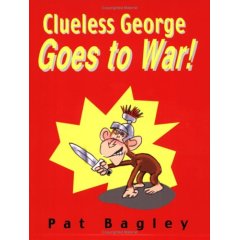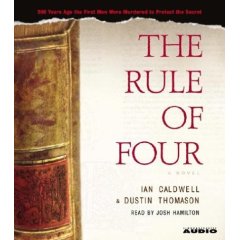
Let me preface this review by saying that if you are anything like me (and therefore know next to nothing about the Balkans) do not read this book without first consulting some encyclopedia source (Wikipedia was my choice) on Yugoslavia, Balkans, Serbia, Montenegro, and Bosnia. Throw in Macedonia, Croatia, and Slovenia if you're really industrious. Trust me, it's extremely helpful. For instance, did you know that after Slovenia, Croatia, Bosnia, and Macedonia left what was once Yugoslavia, "Yugoslavia" was used to refer to Serbia and Montenegro? I didn't know that, and it caused a great deal of confusion as to why this book said Yugoslavia was dissolved as late as 2003.
But on to the substance of the book. I picked this book up at Borders mainly because I wanted to take advantage of their "3 for the price of 2" deal and picking three books was proving harder than I anticipated. But this one looked interesting, and as I previously mentioned, I knew almost nothing about the Balkans. What I did know is that there was a lot of fighting there during the 1990's and that "Bosnia," "Serbs," "Kosovo," and "ethnic Albanians" were terms I remembered hearing a lot on the news when I was younger. But Elizabeth Kostova's
The Historian sparked my interest in Eastern Europe when before I didn't really give that area of the world much thought at all.
I didn't expect to become so engrossed.
Seierstad, a Norwegian journalist who also authored the bestseller
The Bookseller of Kabul, spent time in Serbia as she covered the conflict in Kosovo for Norwegian television. While there she decided to write a book about some of the Serbs she met and got to know during her time there. There are many characteristics of Serbs that prompted her to title her book "With Their Backs To The World." It is certainly an apt description for some, but after reading this book I am not convinced that the converse would not apply equally as well.
A quote from a Yugoslavian rock star that Seierstad profiles sums up, to me at least, the central issue concerning Serbia. His story and personal insights are remarkably cunning and more than once I was awed at his ability to cut right to the heart of the issue. His quote is as follows:
"
If someone had asked me, before 1990, what my nationality was, I'd have been at a loss for words. My mother and father never talked about it. I was baptised as a Catholic, my brother as Orthodox. Today I know full well that my mum is Serbian and my dad half Croat and half Montenegrin."
America is often called a "melting pot" and maybe that's why Rambo's statement seems startling to me. Americans grow up surrounded by not just different ethnicities, but different races. And while we certainly have our problems with race relations, generally Caucasians are lumped together as "whites." The extreme and inherit nationalism in the former Yugoslavia is difficult for me to grasp as an American, especially considering that these are people who have lived within close geographical proximity to each other and were for decades part of the same country, Yugoslavia.
Another issue that is brought up again and again, particularly by members of Slobodan Milosevic's Socialist Party, is the widespread disdain for the West, particularly America, who is primarily blamed for the 1999 NATO bombing of Serbia following reports of ethic cleansing against Albanians in the southern Serbia region of Kosovo. Seierstad makes a point to highlight that a common weakness among Serbs is to recount over and over again the wrongs that have been committed against them while ignoring the wrongs they've committed against others, despite the fact that (from a Western view, anyway) Serbia initiated and lost wars against Croatia, Bosnia, and Kosovo Albanians, and many Serbian politicians and military personnel were charged with war crimes by the Hague.
After reading this book I've come to the conclusion that the Serbs are a bafflingly complex and in someways pitiful people, but I am also convinced that this proud nation does not deserve the vilification that they received from the West during the Balkan conflicts. They are not so different that the rest of us, really, and were victimized by their own government until the October 5, 2000 revolution that removed Milosevic from power. But the saddest part of these stories comes from the depression that has beset many following Milosevic's fall when the new democratic government failed to raise the quality of life in the country. That is part of the reason why the popularity of nationalism is again on the rise in Serbia. America and the West certainly didn't help matters. We sanctioned and bombed their country, destroying bridges and factories that provided economic support to Serbia, then denied them a $100 million aid package for their unsatisfactory cooperation with Milosevic's prosecution. And of course, once 9/11 occured our attention went from defending the Albanian muslims to fighting muslim extremists in Afghanistan and Iraq. Reading these stories, no matter what the political view of the speaker, I couldn't help but feel that, even if the proud and unyielding Serbs have turned their back on the world, the world has turned its back on them as well.
 Not only was this the name of a long-dead beta fish given to me by a long-dumped boyfriend, but it is also a thrilling classic. I reread this book last weekend and was again enthralled by the romance, intrigue and mystery. Fot those of you in the dark ages, this book is set in the 18th century during the French Revolution and "those demmed Frenchies" are chopping off the heads of the snotty French aristocrats. Lord Percy Blakesney, the biggest fop in England marries Marguerite St. Just, the cleverest woman in Europe. Scandels and secrets between the two keep them apart, but this paragraph shows their true feelings. The best paragraph ever is as follows:
Not only was this the name of a long-dead beta fish given to me by a long-dumped boyfriend, but it is also a thrilling classic. I reread this book last weekend and was again enthralled by the romance, intrigue and mystery. Fot those of you in the dark ages, this book is set in the 18th century during the French Revolution and "those demmed Frenchies" are chopping off the heads of the snotty French aristocrats. Lord Percy Blakesney, the biggest fop in England marries Marguerite St. Just, the cleverest woman in Europe. Scandels and secrets between the two keep them apart, but this paragraph shows their true feelings. The best paragraph ever is as follows:

